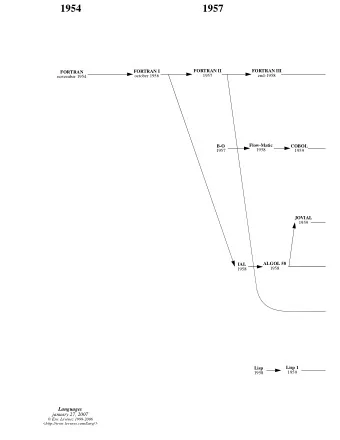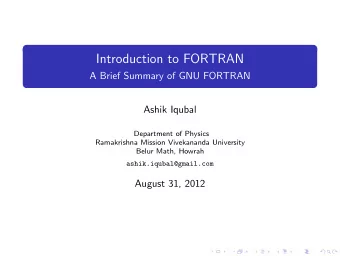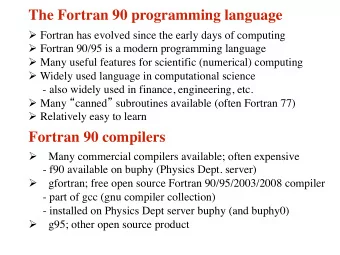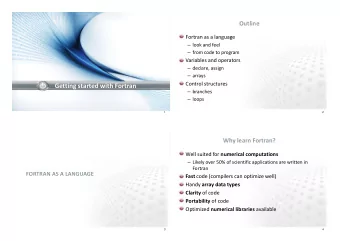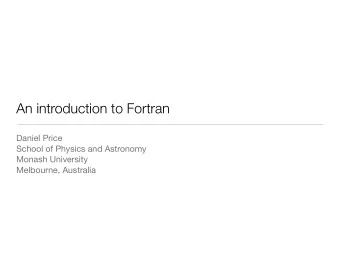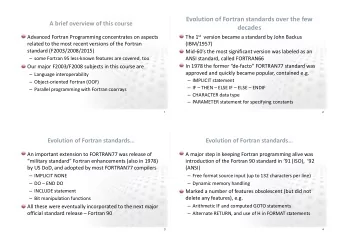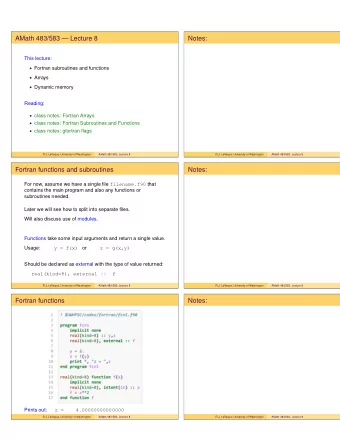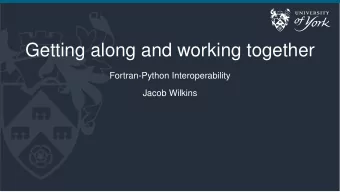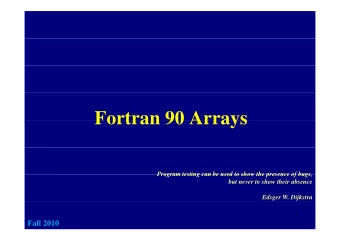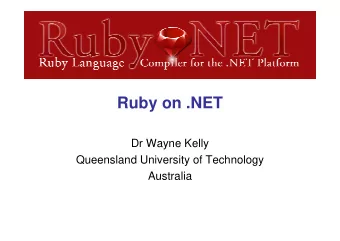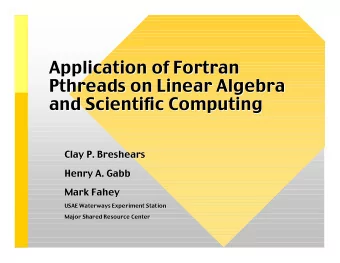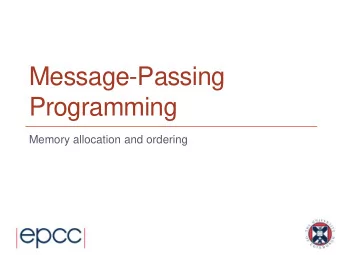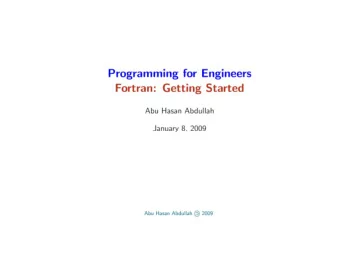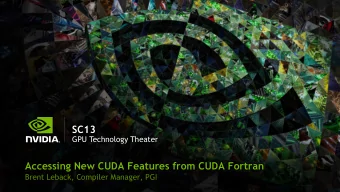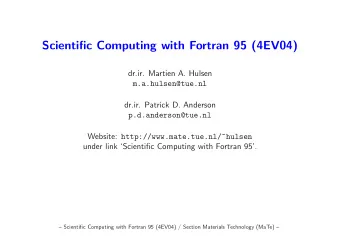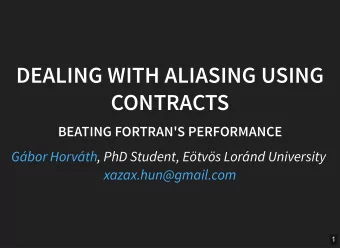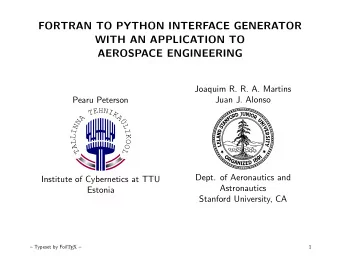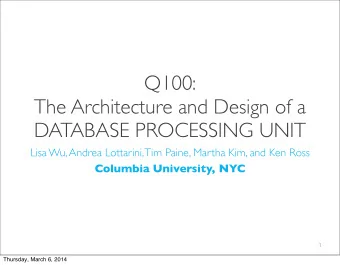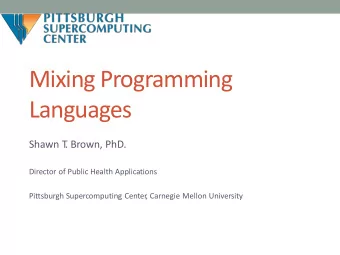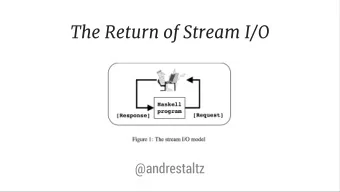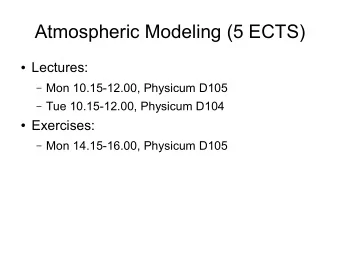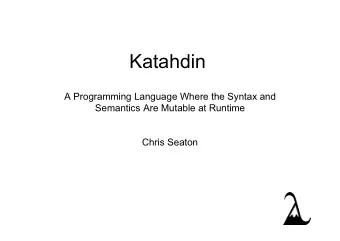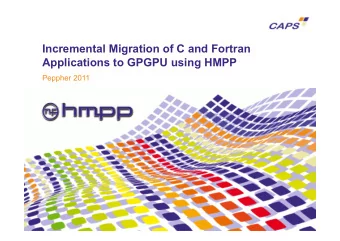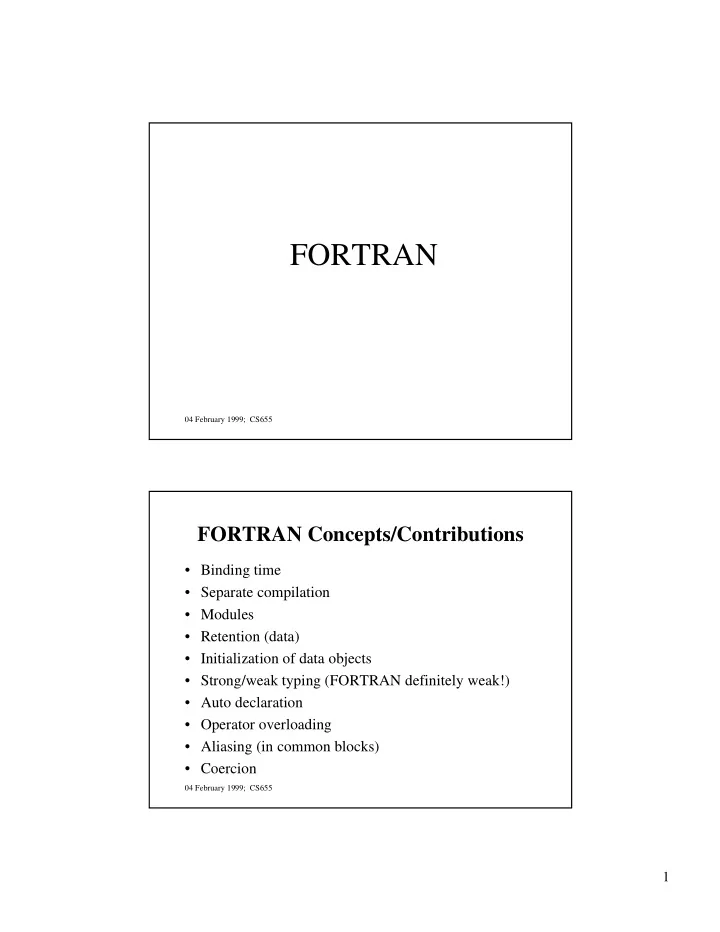
FORTRAN 04 February 1999; CS655 FORTRAN Concepts/Contributions - PDF document
FORTRAN 04 February 1999; CS655 FORTRAN Concepts/Contributions Binding time Separate compilation Modules Retention (data) Initialization of data objects Strong/weak typing (FORTRAN definitely weak!) Auto
FORTRAN 04 February 1999; CS655 FORTRAN Concepts/Contributions • Binding time • Separate compilation • Modules • Retention (data) • Initialization of data objects • Strong/weak typing (FORTRAN definitely weak!) • Auto declaration • Operator overloading • Aliasing (in common blocks) • Coercion 04 February 1999; CS655 1
FORTRAN Design Considerations • Underlying hardware • Efficiency (time) – direct translation to machine ops – optimization • DO loops • array subscripting • Efficiency (space) – equivalence – common – flat structure (no recursion) 04 February 1999; CS655 FORTRAN & Design Principles • Abstraction (control) • Defense in depth (assigned, computed GOTO; DO loop) • Structure (goto’s) • Syntactic consistency (two goto types) • Preservation of information (DO loop) • Zero-one-infinity (array dims, identifier length) • Regularity (strings are second class) 04 February 1999; CS655 2
FORTRAN: Interesting Problems • Array subscripting – limit of three dimensions – limit on subscript expressions • Parameter passing – reference as implemented is dangerous (expr actuals) • Computed/Assigned GOTO’s • Syntax – space compression combined with no key words DO 10 I = 1.10 DO 10 I = 1,10 04 February 1999; CS655 ALGOL60 04 February 1999; CS655 3
ALGOL was indeed an achievement. It was a significant advance on most of its successors. --Alan Perlis 04 February 1999; CS655 ALGOL60 • Design by committee -- US/Europe -- 1957 • Goals: – Machine independence – Improve RE: FORTRAN's established flaws – One standard to end "proliferation" of languages • Model of Computation: – Static block structure (gave additional control over name space) – Recursion [multiple instances of same routine(s)] --birth of stack model 04 February 1999; CS655 4
ALGOL60 Contributions c.f. FORTRAN: • Declaratives: - named the object – Named data objects - allocated fixed memory – Declared their types - provided for initialization – Determined storage in activation record • (or what needed to be done at runtime) – Bound name to that storage – Allowed for initialization • Block structure: scope, visibility, hiding – Scope: range over which name is defined – Visibility: set of names that have meaning – Hiding: re-use of name (in new context) 04 February 1999; CS655 ALGOL60 Contributions (2) • Static vs dynamic referencing became an issue – Static: meaning of non-local ref determined by static context – Dynamic: meaning of non-local ref determined by dynamic call chain 04 February 1999; CS655 5
ALGOL60 Types • Primitive types: – real, integer, boolean, strings (2nd class) – no dub precision (for machine independence) – no complex • Constructors: – arrays only • arbitrary bounds Zero-one-infinity • arbitrary dimensions • arbitrary subscripts – includes functions and other array refs • dynamic sizing on block entry 04 February 1999; CS655 ALGOL60 Types (more) • In general, declarations were required – no auto declarations (except procedure formals, labels) • Strong typing: – The only operations allowed to be performed on a data object are those defined for objects of that type • (one of many defs for strong typing. Others?) • Many loopholes: – labels and integers – specifications and declarations 04 February 1999; CS655 6
ALGOL60 Imperatives • Imperatives: – Computational, control flow, no I/O • Computational- – assignment much more general than FORTRAN's fac:= IF x <= 1 THEN 1 ELSE x*fac(x-1) • Control flow- – Conditional had awkward inconsistency: IF ~ THEN s1 ELSE ~ -- s1 can't be cond'l --violates regularity 04 February 1999; CS655 ALGOL60 Oddities – Conditional booleans odd: IF IF IF a THEN b ELSE c THEN d ELSE f THEN g ELSE h < k – For loop -- very general FOR i:= 3,7, 11 STEP 1 UNTIl 16, i/2 WHILE i >= 1, 2 STEP i UNTIL 32 DO ~ (generates: 3,7,1,12,13,14,15,16, 8,4,2,1,2,4,8,16,32) --user can modify loop indices (see Knuth) -- violates localized cost 04 February 1999; CS655 7
Switch (early case / switch statement) BEGIN switch status= in_air, take_off, landing, on_runway … i:= <integer value> -- out of range treated as fall-through goto status[i]; in_air: ... } no ordering req'mnts landing: ... } can be Switch take_off: ... } anywhere - supports labeling … - violates structure & END security BEGIN switch s = L, IF j > 0 THEN M ELSE N, Q … i:= <integer value> goto s[i]; -- dest depends on j if i=2. Designational … expression END See Knuth for some gems (e.g. p. 617). 04 February 1999; CS655 Example from Knuth: Switch 04 February 1999; CS655 8
Name Parameter Passing PROCEDURE swap (x, y); integer x, y; BEGIN INTEGER t; t:= x; x:= y; y:= t; END swap (i,j) -- works (x:i, y:j) swap (A[i],i) -- works (x:A[i], y:i) swap (i,A[i]) -- doesn't work! (x:i, y:A[i]) -- Similarly, Knuth claims you can't write a general successor function. -- Why? 04 February 1999; CS655 Jensen’s Device real procedure SUM (EXPR, INDEX, LB, UB); value LB, UB; real EXPR; integer INDEX, LB, UB; begin real TEMP; TEMP := 0; for INDEX := LB step 1 until UB do TEMP:= TEMP + EXPR; SUM:= TEMP end proc SUM; Manifest interface??? SUM(A[I], I, 1, 25); SUM (SUM(B[I,J], J, 1, N), I, 1, M) -- How many calls to SUM? 04 February 1999; CS655 9
Undesirable Interactions BEGIN INTEGER max, m, n; READ (max); FOR i:= 1 UNTIL max DO BEGIN READ (m,n); BEGIN OWN REAL ARRAY a[1:m, 1:n]; --Storage? ... <operations on a> ... END END END • How can we deal with changing bounds while trying to keep a copy of "a" around between block entries? 04 February 1999; CS655 10
Recommend
More recommend
Explore More Topics
Stay informed with curated content and fresh updates.
